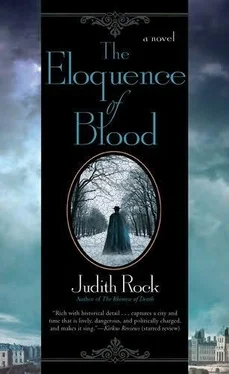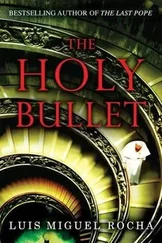Judith Rock - The Eloquence of Blood
Здесь есть возможность читать онлайн «Judith Rock - The Eloquence of Blood» весь текст электронной книги совершенно бесплатно (целиком полную версию без сокращений). В некоторых случаях можно слушать аудио, скачать через торрент в формате fb2 и присутствует краткое содержание. Жанр: Исторический детектив, на английском языке. Описание произведения, (предисловие) а так же отзывы посетителей доступны на портале библиотеки ЛибКат.
- Название:The Eloquence of Blood
- Автор:
- Жанр:
- Год:неизвестен
- ISBN:нет данных
- Рейтинг книги:5 / 5. Голосов: 1
-
Избранное:Добавить в избранное
- Отзывы:
-
Ваша оценка:
- 100
- 1
- 2
- 3
- 4
- 5
The Eloquence of Blood: краткое содержание, описание и аннотация
Предлагаем к чтению аннотацию, описание, краткое содержание или предисловие (зависит от того, что написал сам автор книги «The Eloquence of Blood»). Если вы не нашли необходимую информацию о книге — напишите в комментариях, мы постараемся отыскать её.
The Eloquence of Blood — читать онлайн бесплатно полную книгу (весь текст) целиком
Ниже представлен текст книги, разбитый по страницам. Система сохранения места последней прочитанной страницы, позволяет с удобством читать онлайн бесплатно книгу «The Eloquence of Blood», без необходимости каждый раз заново искать на чём Вы остановились. Поставьте закладку, и сможете в любой момент перейти на страницу, на которой закончили чтение.
Интервал:
Закладка:
“Ah. Yes, I see, very nice.” La Reynie nodded appreciatively at the pots. “One would like to see them at close range.”
“One would. Shall we pay a visit to the kitchen?”
“We were already going to. That’s where Reine will be, if she’s here. But we should go now, before our interested friend disappears. The necessity is through there, anyway. After you, maitre.”
“You are too courteous, monsieur.”
Charles drained his coffee bowl and set it down. Rising, he walked casually toward the slightly open door. It shut with a snap. He told himself that even in these times, most people would not do a cleric serious damage. Whatever the truth of that, the invulnerable feeling coffee seemed to give him was rising into his head, and he pushed the door open harder than he meant to. It slammed against the wall and bounced back into his hand. Which told him that the watcher was not behind the door.
“I beg your pardon,” he said genially, and stepped into the kitchen.
An aproned man squatting beside the fireplace with a long-handled fork in his hand stared at him and went back to poking a roasting chicken. A frowning woman of thirty-five or so stood at the central table, kneading dough. But Charles still had the feeling that someone was watching him. Sensing La Reynie at his back, he let go of the door and stepped farther into the kitchen.
“The necessity, monsieur, if you please?” he asked the man at the fireplace.
“In the yard.” He gestured with his fork.
“You first, maitre.” La Reynie moved up beside Charles. See who’s out there, his eyes added.
As Charles crossed the room, shadows moved in a corner. He tilted his head slightly toward the movement and kept going.
Behind him, La Reynie circled toward the corner, chatting affably to the cook and the woman. Charles went out into the cluttered back court, stopping the outer door’s swing so he could hear what went on in the kitchen. He surveyed the yard. A man unloading barrels from a cart and rolling them across the snowedged cobbles and down a ramp to the cellar paid him no attention. Charles looked swiftly into the privy beside the kitchen door, found it empty, and went back inside.
La Reynie, holding a rusted iron candlestick with a tallow candle in it, was standing in front of the corner where the shadows had moved. The man with the fork had dragged a stool in front of the fire and set a carafe full of dark wine beside it. He was sipping from a large glassful as he kept loving watch over his chicken. The woman at the table had stopped kneading her dough and was scowling at La Reynie.
Drifting toward the corner, Charles put himself between her and the lieutenant-general.
“… then when and where did you last see him?” La Reynie was saying, still looking into the corner.
“Thursday evening. Here.” The voice was a woman’s, old but still melodic, like a cracked viol that could make you imagine its past glory.
“At what time?”
“He left just before the absurd hour you force Monsieur Procope to close, mon cher.” The woman’s laughter played suddenly up and down the scale. “Come, Nicolas, it is not the old days, you cannot herd people into their houses at dark, like they were cows.”
Mon cher? Nicolas? Charles shifted, trying to see the woman, and waiting for La Reynie to put her scathingly in her place.
But he didn’t. He laughed. “That never did work well, did it? As you know better than any of us, Reine.”
The woman laughed deep in her throat. “Curfews were never worth a cabbage, and the ones who made them were the worst at keeping them. You certainly were.”
Bewildered by the easy familiarity, Charles moved again, trying to see La Reynie’s face without interrupting him. The lieutenant-general was smiling a little, looking with affection at the hunched figure in the corner. The woman was sitting on a low stool, working at something held in her lap. The frayed gold embroidery on her tattered velvet underskirt caught the candlelight, and her scarlet taffeta bodice had alien yellow sleeves. Her patched black overskirt was so threadbare it hardly needed to be open in the front to display the underskirt’s gold thread. Ragged saffron lace was wrapped around her withered neck, and a turban of stained blue satin, intricately wrapped with more of the saffron lace, covered her hair. Charles wondered if her parents had named her Queen, or if that had come later. In her bizarre way, she looked regal enough.
“Back to business, Reine,” La Reynie said. “Why did Henri Brion leave Procope’s before closing?”
“Why do men leave, Nicolas? Because they have somewhere more important to go.” She lifted her gaze suddenly. Her face was a maze of lines, and Charles thought she was at least sixty. But her vividly green eyes were as young as new beech leaves.
“Please,” La Reynie said softly. “I need to know.”
“Then know that he left with two men. Not willingly, I thought. But he went. They walked him out the door between them, pretending he was drunk-he wasn’t-and then they took hold of his arms and he had no choice at all.”
“Where were you, to see this?”
“Outside. By the door.”
“You were begging.”
“Yes, Nicolas, begging. Looking cold and pathetic and making a nice bit for my supper. Not as much as I used to make, of course. But still needing the charity of men in order to eat. But isn’t that the fate of women?”
“Did you recognize the men who took Brion? Or hear what they said? Where they were taking him?”
Reine bent over her lap again, and Charles saw that she had a small knife and was working carefully at a piece of wood.
“I don’t know where they took him. They walked toward the river. One man I knew. Monsieur Claude Bizeul, a goldsmith.”
La Reynie said sharply, “A goldsmith? Are you sure?”
The old woman didn’t speak, seeming absorbed in her carving, and to Charles’s surprise, La Reynie waited patiently.
“Oh, yes, Nicolas, I am very sure,” she said at last, still not looking up. “Claude Bizeul is white haired now, but he has kept his figure admirably. His companion I’ve seen here before, but I don’t know his name. He is a younger man, dark haired. Taller.”
“And they went toward the river? You’re sure?”
“Of course I’m sure.”
“Where does this Monsieur Bizeul live?”
Her hand stilled. “I will have to think on that.”
“Think well, Reine.” But he didn’t press her. Instead, he turned to the woman kneading dough. “Did you see any of this, Renee? Do you know these men?”
She shook her head and reached up to tighten the white linen kerchief she wore over her brown hair, fumbling with the knot at the nape of her neck. “I was back here, how could I see them?” she said, returning to her kneading as if she had her enemies under her hands.
“You were not, you were still at your Martine’s house,” the cook said laconically, without looking around.
The woman flung her head up and spat over her shoulder, “What if I was? Who cares where I was?”
La Reynie glanced at Reine, listening intently from her corner, then turned back to Renee. “Ah, yes, you worked in the Mynette house,” he said to the younger woman, making it a statement, not a question. “How could I have forgotten that?” His tone made it clear to Charles, at least, that he had not forgotten for a moment.
Renee leaned on her fists in the dough, her breath coming short. “Yes, I worked there. And if I could find the animal who murdered her, I would tear his throat out. Whoever he is, he came there to kill her. Don’t bother thinking he was some ordinary thief she interrupted as he was about his black business. Your commissaire made me search the whole house and nothing was taken. Nothing!”
Читать дальшеИнтервал:
Закладка:
Похожие книги на «The Eloquence of Blood»
Представляем Вашему вниманию похожие книги на «The Eloquence of Blood» списком для выбора. Мы отобрали схожую по названию и смыслу литературу в надежде предоставить читателям больше вариантов отыскать новые, интересные, ещё непрочитанные произведения.
Обсуждение, отзывы о книге «The Eloquence of Blood» и просто собственные мнения читателей. Оставьте ваши комментарии, напишите, что Вы думаете о произведении, его смысле или главных героях. Укажите что конкретно понравилось, а что нет, и почему Вы так считаете.












